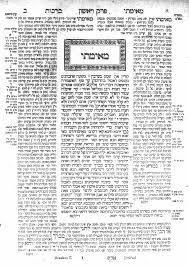Daffy doctors: the rewards and superficial accomplishments of daily study
Thousands of Jews around the world recently celebrated the end of this round of the Daf Yomi, a seven-year cycle of daily Talmud study. Obviously there is no equivalent regimen of daily study in medicine.
Or isn’t there? Medical education, even continuing education of professionals, goes through many fashions – just like Judaism does (the Daf Yomi is less than a hundred years old). When I was a medical student, it was said of some our mentors, always in tones of awe, that they read a page of Harrison’s every day. Harrison’s is a stupendoginormous chunk of book, weighing in at over 1,000 pages and purporting to encompass within its unembarrassed girth every bit of internal medicine. 
I don’t know if anyone does the Daily Harrison’s any more, but I know that daily study, or at least daily acquaintance with new bits of knowledge, is still an activity with quite a number of adherents. I happen to be one of them. Like many other doctors, I subscribe to a number of email lists which present digests of new research articles. Many journals offer updates of the latest developments of medicine. So, in fact, part of my daily ritual in the study of medicine is opening up my inbox and learning my daily dose.
The critiques that have been made of the Daf Yomi can also be made of the scientific literature. The latest is always made out to be the greatest. The new page, the new journal-article digest, rises to the uppermost level of our minds and stays there only until a newer bit of news displaces it.
Learning this way, day to day, we only glide along the surface. There are uncountable riches beneath each page of Talmud – links among pages; commentaries on each passage; application of theory to Jewish practice past and contemporary. Similarly, each journal article is a thumbnail sketch of a vast landscape of medicine: the research literature for any significant topic stretches back years and multiplies logarithmically.
And it’s even more incomplete than that: because the refreshers of the medical literature ignore two huge facts. (1) Not all the literature is scientifically sound, even the links that make it to the email digests. (2) Not all of medicine is evidence-based: to take a few examples, our relationship with patients, our ethical and societal responsibilities, and our self-image as doctors are affected by things quite outside the realm of ACP Journal Club (which I like a lot).
Thus, much as the Daf Yomi is looked at askance by many, the daily email digests, the blizzard of articles, and the heady but unrepresentative 30,000-foot view of medicine are not ideal. We need to recognize complexity and factor it into our practice and self-image as providers.
How do we do that? Should we make an effort to express the complexity of medicine in an explicit way to our patients and colleagues? As some Talmud learners – perhaps just to be difficult – sniff at the daily dose of learning and seek out depth, should we doctors, even those of us who aren’t academics, make an effort to do regular systematic reviews of the literature to inform our own practice? Maybe we should do so in partnership with our patients, as unrealistic as that might sound? Your suggestions please.



